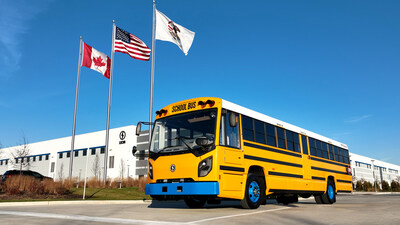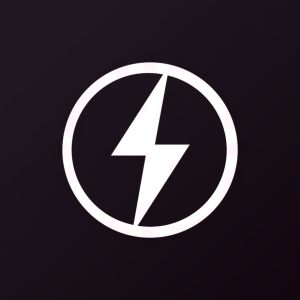LION ELECTRIC INITIATES DELIVERIES OF LIOND, A NEW ALL-ELECTRIC SCHOOL BUS MODEL
The launch of this new model reaffirms Lion's unwavering commitment to safe zero-emission transportation providing cleaner air for children and communities in
"We're excited for customers to deploy their LionDs and experience all that they have to offer. These electric school buses, which are in high demand on the West Coast, are manufactured in
The LionD has been designed with safety at the forefront, as with every product engineered by Lion -- from improved air quality and reduced noise pollution to an extra-wide center aisle making for efficient entry/exiting as well as improved rearward driver visibility. It has a programmable low-speed sound generator, forward visibility optimized front windshield for improved sight of cross traffic and student safety when walking in front of the bus, and an ergonomically designed driver cockpit.
Built on the successful foundation of the all-electric LionC, which has been transporting students across
Purpose-built for electric, the LionD is advantaged by its design with an all-electric powertrain that offers lower energy and maintenance costs compared to traditional diesel-powered school buses. Similar to the LionC, it features rust-free composite body panels, staircase, and low-voltage battery compartment, as well as a modular lower skirt and one-piece seamless fiberglass roof that eliminates thousands of rivets and potential leak points – minimizing service expenses and maximizing uptime.
As with all of Lion's products, school districts and contractors considering the LionD have direct access to the Lion Customer Success team, who are experts in supporting the transition to zero emissions and maximizing customer operational success. The support extends from charging infrastructure with LionEnergy, financing assistance with LionCapital Solutions and funding support services provided by the LionGrants team, to driver/maintenance/safety training from Lion's BrightSquad and proprietary EV telematics with LionBeat.
Currently, federal, state and local funding, and incentives such as the EPA's Clean School Bus Program, California HVIP, the IRA clean commercial vehicle tax credit (IRC 45W) and others can be applied for to assist with the purchase of a LionD.
School districts and fleet customers ready to start their electrification journey are invited to contact Lion Electric at marketing.lion@thelionelectric.com.
To learn more about the LionD visit:
https://pages.thelionelectric.com/liond-the-all-electric-type-d-school-bus-usa/
Lion Electric is an innovative manufacturer of zero-emission vehicles. The company creates, designs and manufactures all-electric class 5 to class 8 commercial urban trucks and all-electric school buses. Lion is a North American leader in electric transportation and designs, builds and assembles many of its vehicles' components, including chassis, battery packs, truck cabins and bus bodies.
Always actively seeking new and reliable technologies, Lion vehicles have unique features that are specifically adapted to its users and their everyday needs. Lion believes that transitioning to all-electric vehicles will lead to major improvements in our society, environment and overall quality of life. Lion shares are traded on the New York Stock Exchange and the Toronto Stock Exchange under the symbol LEV.
This press release contains "forward-looking information" and "forward-looking statements" within the meaning of applicable securities laws and within the meaning of the United States Private Securities Litigation Reform Act of 1995 (collectively, "forward-looking statements"), including statements regarding the estimated energy and maintenance costs reduction offered by the LionD, the availability of federal, state and local funding and incentives to assist with the purchase of the LionD, statements about Lion's beliefs and expectations and other statements that are not statements of historical facts. Forward-looking statements may be identified by the use of words such as "believe," "may," "will," "continue," "anticipate," "intend," "expect," "should," "would," "could," "plan," "project," "potential," "seem," "seek," "future," "target" or other similar expressions and any other statements that predict or indicate future events or trends or that are not statements of historical matters, although not all forward-looking statements may contain such identifying words. The forward-looking statements contained in this press release are based on a number of estimates and assumptions that Lion believes are reasonable when made. Such estimates and assumptions are made by Lion in light of the experience of management and their perception of historical trends, current conditions and expected future developments, as well as other factors believed to be appropriate and reasonable in the circumstances. However, there can be no assurance that such estimates and assumptions will prove to be correct. By their nature, forward-looking statements involve risks and uncertainties because they relate to events and depend on circumstances that may or may not occur in the future. For additional information on estimates, assumptions, risks and uncertainties underlying certain of the forward-looking statements made in this press release, please consult section 23.0 entitled "Risk Factors" of the Company's annual management's discussion and analysis of financial condition and results of operations (MD&A) for the fiscal year 2022 and in other documents filed with the applicable Canadian regulatory securities authorities and the Securities and Exchange Commission, including the Company's interim MD&As. Many of these risks are beyond Lion's management's ability to control or predict. All forward-looking statements attributable to Lion or persons acting on its behalf are expressly qualified in their entirety by the cautionary statements contained and risk factors identified in the Company's annual MD&A for the fiscal year 2022 and in other documents filed with the applicable Canadian regulatory securities authorities and the Securities and Exchange Commission. Because of these risks, uncertainties and assumptions, readers should not place undue reliance on these forward-looking statements. Furthermore, forward-looking statements speak only as of the date they are made. Except as required under applicable securities laws, Lion undertakes no obligation, and expressly disclaims any duty, to update, revise or review any forward-looking information, whether as a result of new information, future events or otherwise.
![]() View original content to download multimedia:https://www.prnewswire.com/news-releases/lion-electric-initiates-deliveries-of-liond-a-new-all-electric-school-bus-model-302044315.html
View original content to download multimedia:https://www.prnewswire.com/news-releases/lion-electric-initiates-deliveries-of-liond-a-new-all-electric-school-bus-model-302044315.html
SOURCE The Lion Electric Co.









